Safety matters most, but will dining out guidelines take the joy out of eating? Chef-restaurateurs in India and around the world debate a post-lockdown future.

(Left) Currently, Asian fine dine restaurant House of Mandarin has seven people working in the kitchen, including chefs and the housekeeping team led by Chef Subhash Kunche. On the service side, five people handle order taking and delivery. The team stays
There are a set of coasters at Alex Sanchez-s Kala Ghoda bistro bar, Americano, that carry the Italian saying, Avere ill prosciutto sugli occhi. Literally, it means to have ham over one-s eyes. What it refers to is to have to wake up to rude reality.
ADVERTISEMENT
The chef-restaurateur from San Francisco, who found fame in Mumbai-s food and drink landscape as a 26-year-old, knows it-s going to be tough to accept the new truth. In March 2019, after a sabbatical of self-discovery and travelling through Italy, he returned to this city to do what all chefs dream of, set up his own restaurant. He was going to serve American-inspired Italian fare and world class cocktails in a glamorous South Mumbai outpost at Kala Ghoda that was designed to celebrate shared spaces through a community table and rest-your-elbow stations in window alcoves perfect for pairs.
After a phenomenal one-year run, with tables sold out days in a row, Americano stands shuttered like most other fine dine addresses in a lockdown that hopes to contain the spread of the Coronavirus in one of India-s worst affected cities. He is aware that it is going to be far from back-to-business when the restrictions lift. A battered economy and rigid safety norms cannot be a restaurant-s best friends. "We created the kind of restaurant we would like to go to—something unique that added value to the community. We are in no rush to change what we built," he says about the business he launched with partner Mallyeka Watsa. While some high end restaurants may consider switching to the home delivery model, Sanchez cannot imagine the reinvention. "We don-t see Americano fit into a stiff box," he says, sharing that he is unlikely to open for business until it can do so as the original concept. He is considering, however, a separate delivery-only idea.

Chef-restaurateur Alex Sanchez and Mallyeka Wasta cannot imagine offering Americano-s fare via delivery. They say, they will wait until the one-year-old bistro-bar can open doors in its original avatar. File Pic/ Bipin Kokate
The question on Sanchez-s mind was also the subject of discussion at a webinar held last week by the Hong Kong-based independent strategic marketing and communications consultancy CatchOn— Can the restaurant industry survive COVID-19? On the panel were Peter Kreiner, CEO and Partner at The Noma Group, Denmark; Mark Canlis, owner, Canlis, New York ; Syed Asim Hussain, co-founder, Black Sheep Restaurants, Hong Kong; Loh Lik Peng, founder, Unlisted Collection, Hong Kong; Garima Arora, executive chef and founder, Gaa, Bangkok, and Alan Lo, co-founder, Duddells, Singapore.
The food and beverage industry the world over was the first to take a hit after countries announced a lockdown since it relies on cash flow. Some governments, including in Singapore, Denmark, UK and Australia, have been proactive in offering aid. In Singapore, the government has covered 75 per cent of a worker-s wages. It has also made it illegal for landlords to kick out tenants for the next six months if they prove that their business has been hit by the pandemic. The Danish government has also stepped up to cover wages. "All our chefs, cooks and front of the house team have been compensated to a cap of 4,500 USD per month with the aim to keep as many people employed as possible," says Kreiner, who heads the group that runs the gastronomic Mecca headed by chef René Redzepi, whose reinterpretation of Nordic cuisine has won consistent awards, including placing the restaurant at No. 2 in the Best Restaurants in the World list last year. Kreiner adds that they have also benefited from the fixed cost compensation package, which covers rent and lease costs, but not produce. In Hong Kong, Lo has launched a campaign called Save Hong Kong F&B, the voice of 600 restaurants in the city. He argues that to keep tables 1.5 metres apart and limited per-person reservation to four guests applies to the tiny local eateries, and isn-t feasible for fine dine restaurants and cocktail bars. "We-d rather have a more decisive step taken like shutting down the city completely for 40 days and compensating the wages at 50 per cent. In the first round, relief came in the form of salary subsidies up to 10,000-30,000 USD one off relief to all restaurants and government-backed loans. But these don-t come to us until June. How can a cash business survive the next 60 days?"

Riyaaz Amlani
A poll he conducted among 600 restaurants representing 10,000 workers threw up the following results. Fifty seven per cent said business had stopped at 60 per cent; 99 per cent said not enough support was coming from the government; 58 per cent said their rent was amounting to more than 30 per cent of revenue.
Hussain, whose company has been advising the Hong Kong government through the process, pointed out that rental support was their big suggestion. In Asia, rental support is crucial since rates are some of the highest in the world. Hong Kong has always been a landlord-s market. Tenancy protection is number one on the list. We will have bailiffs knocking at our door, and we need assistance with that," says Hussain.

While in India restaurants came together under the National Restaurant Association of India umbrella to ask for rent and tax waivers, the landlords have also banded together, creating WhatsApp groups to rally. "Landlords have loans to pay in the form of LRDs lease rental discounting or loan against rent and for example, if a restaurant was paying them R12 lakh in rent per month which was directed to the bank as a loan payment, how will the landlord make do with a lower rent?" asks Chirag Maru, real-estate expert. In his opinion, property owners and tenants will have to sit down and work out a win-win situation. "For the first six months, the rents need to be renegotiated and move to a flat revenue sharing to support the restaurant; which can be 10-14 per cent, depending on the restaurant category. If a landlord gives a heavy discount in the first six months, the restaurateur can offer a higher revenue sharing profit in the second half once the footfalls come. The ideal scenario is where the bank also takes a hit and offers an extension on moratorium," he says.
According to Maru, this renegotiation of rent will depend on many factors, including the success and past payment history of the restaurant brand before Coronavirus. Similarly, restaurateurs will have to renegotiate their rents to sustain.
According to sources, an estimated drop in real estate rent of 35 per cent is likely. Pre-Corona, Colaba was Rs 12L per month, Lower Parel was Rs 12-13L, Bandra and BKC at R15-16L and Powai at Rs 9-15L for a 3,000 sq ft space Karan Khetarpal, owner of The Sassy Spoon and House of Mandarin, says, "We are in talks with our landlords to reduce rents. While some are sympathetic and ready to climb down by 50 per cent or consider a revenue share for the next few months, some from the unorganised sector are unrelenting." One option would be for the BMC to waive off property tax for landlords, a benefit that can be passed on to tenants/restaurateurs via reduced rents to free up cash flow and allow the payment of wages and vendor deliveries. He says the US has announced a 2.2 trillion package of which 800 million comprises loans at zero per cent interest. "Similar to the unemployment benefits offered in the US, here, the Employee Provident Fund Organisation EPFO programme can contribute towards wage payments," he says.

Peter Kreiner of The Noma Group, Copenhagen, says they have benefited from the fixed cost compensation package, which covers rent and lease, but the restaurant itself has decided to keep the kitchen working, making meals for the staff to pick up and take home. Dining has been shut temporarily. Switching to "family mode", they say, they will continue to pay the staff-s supplementary private health insurance
In February, when reports of the virus started pouring in, apart from noting body temperatures of guests, Hussain introduced a health declaration form that they had to fill up to ensure the safety of the restaurant staff. "In the beginning, we were turning down close to 50 guests a night and there was backlash. But we owed it to our team," he says.
Noma was one of the first restaurants to announce a complete shutdown of its restaurant and bakery in Copenhagen six weeks ago. Around the time, the government shut schools and closed the borders. Kreiner says, "We didn-t know all the details back then. The main concern was the well-being of the staff. With tourists comprising a major chunk of our guests, we decided it didn-t make sense to start home deliveries for locals."
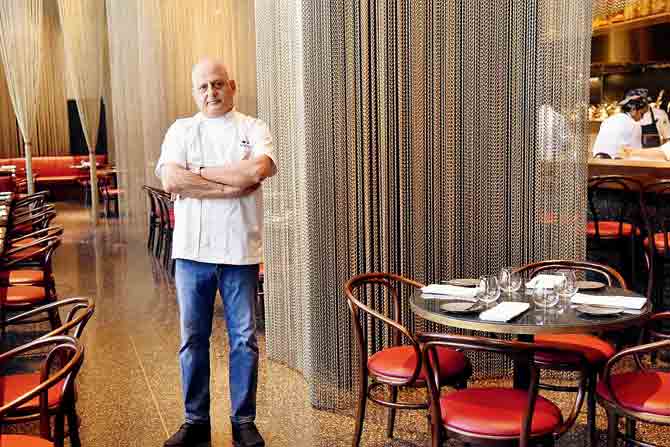
Rahul Akerkar-s one-year-old restaurant Qualia, which presents modern food with local flavours, may gain eventually by making room for social distancing and maintaining hygiene standards in the post-COVID 19 world. File pic
Since the lockdown, one staff member at Noma continues to make meals at the restaurant for the staff to come and pick up family portions. Even ex-employees have been extended this benefit.
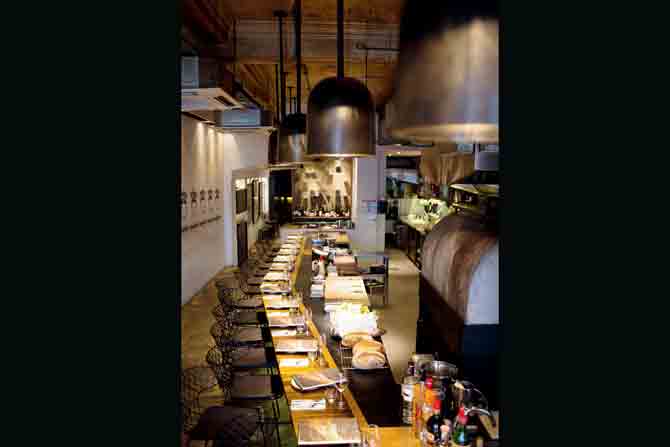
Burnt by Unlisted Collection in Singapore by Loh Lik Peng
According to Peng, in Singapore, even three-Michelin-star restaurants have embraced the delivery model. "I think the model where we expect people to gather will change permanently. Even after the end of the pandemic, delivery will continue to be an important aspect of the restaurant business," he thinks.
At Canlis, a 70-year-old fine dining institution in New York, the team has dished out three new concepts with the goal of keeping the staff employed—a takeout ice cream line, a burger and fries joint, a bagel and sandwiches shed and lastly, a delivery menu. "We had new rules to play by and we checked the resources we had. We were fortunate that the city supported the move. While the kitchen staff went on with their work, the front of the house guys took on the job of delivering the orders. Of course, there are risks. This is not a time for dining, forget fine dining. But, it seemed like one of the life boats we could hop into," says Canlis.

Loh Lik Peng
Like Noma, Gaa in Bangkok, which draws on its Mumbai chef-owner-s Indian roots, decided to stay away from delivery. "Yes, our first instinct was to open for delivery and adapt to the times. But I took into account the health situation ahead of us," says Arora, India-s first female chef to win a Michelin star.
There are those who argue that deliveries are going to be the new normal, and it-s time that restaurants and aggregators re-examine their blow hot-blow cold relationship. Interestingly, two years ago, Hussain, whose Black Sheep Hospitality runs 50 establishments, started his own delivery arm called Black Sheep Go. "We even got our premium brands like New Punjab House and Belon on it. Not everyone has the bandwidth to do this, though. The aggregators will have to re-examine the fees they are charging in this environment. The additional marginal revenues that aggregator apps bring restaurants doesn-t translate to marginal profits." By most estimates, while a restaurant in Mumbai makes R1,500 from a dine-in order, it-s only about Rs 300 from a delivery.

Ankit Mehrotra, Dineout; Karan Khetrapal, House of Mandarin
In Thailand, the government introduced a watchdog group to oversee aggregator activity. They were fined when they increased fees from 20 per cent to 40 per cent now capped at 30. "Aggregators were providing health insurance, safety gear and sanitisers to the delivery front-liners. In Bangkok, we have seven different companies. So, they keep their prices competitively low," says Arora of aggregators in Thailand.
But, just like the restaurants owners, aggregator heads say they were caught unprepared. Ankit Mehrotra, founder, Dineout, claims business is down by 95 per cent. "If no one goes out, how can we work?" he wonders.
Aggregator apps that began as discovery platforms saw a boom in the last few years, birthing the online discount game. "Discounts won-t exist like they did before the lockdown. Privilege cards [Dineout owns Gourmet Passport] that offered discounts at select high-end outings stand cancelled for the time being. Plans to reinvent are on. Contactless dining—where a consumer can book a table, check the menu, place orders and even pay digitally on the app—is being planned."
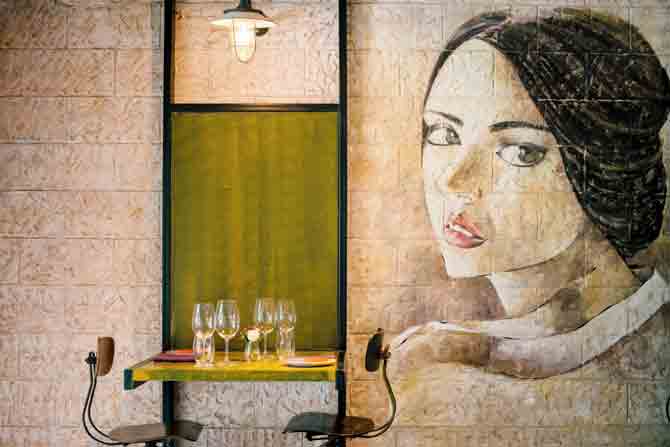
Khetarpal cites the examples of Doordash in the US and UK that has slashed its commission by 50 per cent. In San Francisco, the local administration has put a cap on delivery commissions. In India, aggregator commissions average around 25 per cent and restaurants argue that they do little to support the industry they depend on. Meanwhile, in the garb of "contactless dining", aggregator apps are keen to profit off the dine-in segment by looking to take a cut of 5 per cent on services offered, when in fact, restaurants provide the same free of charge.
A couple of weeks into the national lockdown in India, after the government announced permission for delivery of food, aggregators and restaurants saw a ray of hope. But when a pizza delivery personnel in Delhi working for Zomato tested positive for COVID-19 on April 16, and 72 families he delivered to were put into self quarantine, it sent everyone into panic. Mehrotra believes it-s only technology that can instil confidence in the customer once again. He is discussing the possibility of restaurants installing cameras inside the kitchen to allow a real-time feed of food preparation to relay on Dineout for customers to see. Installation of UV sterilisers to sanitise cutlery is another attempt to up hygiene standards.
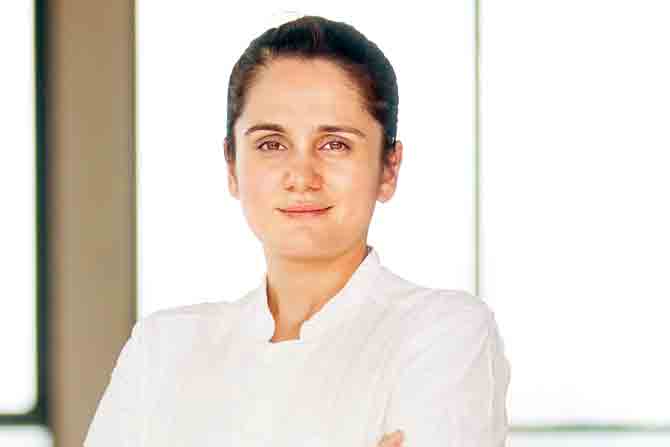
Gaggan Anand-s protege, Mumbai-born Garima Arora who runs the award-winning Gaa in Bangkok says she going to have to rethink her business model given that tourists accounted for much of the footfall. She says, "Will locals pay 200 for a meal? I doubt it."
One of India-s most successful hospitality entrepreneurs, Riyaaz Amlani of Impresario Handmade Restaurants, says, "The infrastructure needed to run deliveries is unfeasible right now, in my opinion." Amlani sees direct ordering from restaurants as the future. "Restaurants will have to focus solely on building this customer confidence. Restaurants that don-t have the trust factor will suffer. The aggregators can be a discovery platform, but that is it. Customers should order directly from the restaurant. We have 50 per cent staff out of work for the moment and they can be utilised for deliveries, for instance. We don-t need aggregators. We were overpaying them anyway. Why should restaurants who offer service inside [their establishments] not be able to provide it outside to consumers?"
Amlani is on the opposite side from most when it comes to predicting the future of fine dine restaurants. He believes, it-s the mid-level market in fact, that will see the highest erosion. "[Fine dining] is safer, has an inherent trust value. I am no fortune teller but it-s likely that one in four restaurants will shutter. People put their homes on mortgage to start restaurants, workers are not going to have jobs for a while, and we have not reached the peak [of infections] yet. These are tough times."
Chef and owner of Lower Parel-s Qualia, Rahul Akerkar is his usual candid self when he says, in the short term, "this segment is fued. Because people won-t earn as much, they won-t spend as much. Until they find the courage to get out, existing high-end restaurants whose business model is centred around in-house dining and a wine list, will have to wait it out. But, in the long term, it is elevated dining that will stand a better chance. "It has a slow pace, more space, spacious tables for social distancing. You can afford a smaller fine dine space with a 30 to 40 cover," he thinks. For now, he is working on a delivery menu with simple offerings. "Safety comes first, but no one wants an astronaut in gloves serving them in a fine dine."
Post lockdown, masked servers and kitchen functioning like labs, is like to be a comon sight. Gaurav Gidwani of budget bar chain, The Bar Stock Exchange, says social distancing and safety measures will kill the personal touch. "We are social beings, and eventually, people will want to step out. Safety rules will mean that service will be swifter and interactions will be curbed. Reducing covers by 50 per cent translates to 50 per cent drop in sales. With per-person bookings for only up to four people, diners will have to schedule and time their outings. Community tables are out!"
Partner at the Olive Group and chef-owner of Monkey Bar and Toast and Tonic, Manu Chandra says if everyone is thinking delivery, the players are in for a blood bath. Pre-lockdown, dine-ins earned 50 per cent of the revenue, followed by alcohol sales, with delivery coming last in the business paradigm. "The last, which is currently the pick of the season, cannot be the backbone of the business," he says, adding that the upside of continued patronage and hence, a possible redemption for fine dine restaurants might depend on how they restructure their business. "They might have to work with fewer staff. It-s one of the scenarios his team is keeping in mind, other then unrelenting landlords and encountering a completely different customer. The danger of a recession is undeniable, which will take a toll on how disposable income is spent, and the gusto with which people were social a few months ago. I hope in my heart, that it all turns out to be untrue, but preparing for a worst-case scenario is the smart thing to do," he says.
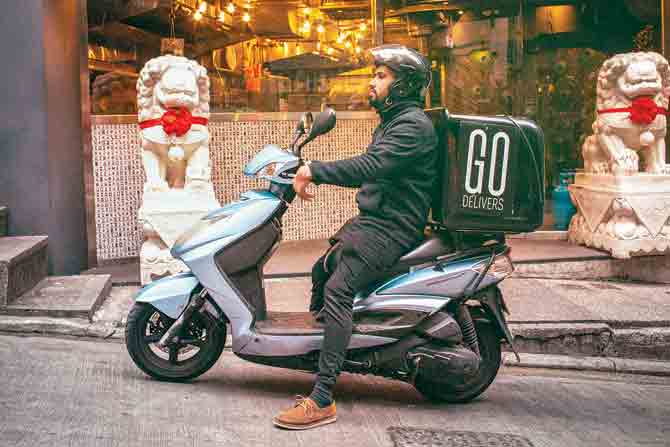
Two years ago, Syed Asim Hussain, whose Black Sheep Hospitality runs 50 establishments in Hong Kong, started delivery arm Black Sheep Go. Food delivery aggregator apps across the world will have to re-examine their fees, he feels
Meanwhile, the staff are playing the wait-and-watch game. A research and menu development professional who didn-t wish to be identified for the story, resigned from her job at a Kamala Mills restaurant on March 14 to take a break and prep for her wedding. Two days later, it shuttered. She is going to have to wait till the storm blows over and possibly settle for a lower paying profile.
Despite the grim scenario, those who are in this for the long haul are trying to stay optimistic. While most high-end fine dine restaurants across the world depend largely on tourist footfall, this, in the new world, is likely to change. Arora says she is looking at ways to better her local footfall by reworking the menu and price points, "relook at what we cook and how we serve... Will locals pay 200 dollars for a meal? Most likely not."
Canlis thinks it-s a good time to explore, strategise, take a pause and look inward. "Will people show up for dinner or not? Someone has to have the heart to figure this question out."
A note by René Redzepi and team on the Noma site updated on April 8 says: Despite the fact that being together is at the heart of everything we do, the reality is very much that at this time, being together is not in the best interests of our community. We may be closing the doors to our restaurant for a short while, but we are not closing the doors to life, to friendship, to community, or to each other.
Gourmet food at home
DIY dining and finishing off a dish at home might be the new trend. Smoke House Deli has introduced a DIY Deli range in which orders are filled with fresh ingredients and recipes for customers to cook at home. Serving two, the kits include options like Penne Arrabbiata, Fusilli in Cheesy Alfredo, Ol- School Mac n Cheese and Tomato Mascarpone Risotto. For example, a Mac n Cheese kit comes with blanched pasta, bechemel sauce, three-cheese blend and crumbled brioche and easy-to follow instructions of cooking the dish at home. The customer only has to follow them.
The Chocolate Chip Cookie premix by Sweetish House Mafia has seen a spike in sales since March. A half kg packet priced at Rs 500 makes 15 cookies. All a customer has to add is egg or substitute in the form of oil, water and baking powder, butter and vanilla essence.
Catch up on all the latest Mumbai news, crime news, current affairs, and a complete guide from food to things to do and events across Mumbai. Also download the new mid-day Android and iOS apps to get latest updates.
Mid-Day is now on Telegram. Click here to join our channel @middayinfomedialtd and stay updated with the latest news
 Subscribe today by clicking the link and stay updated with the latest news!" Click here!
Subscribe today by clicking the link and stay updated with the latest news!" Click here!






